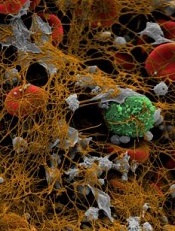
Credit: Andre E.X. Brown
CHICAGO—An experimental agent known as andexanet alfa can reverse the anticoagulant effect of apixaban in healthy volunteers, a phase 3 study suggests.
All subjects who received andexanet alfa after treatment with apixaban exhibited at least a 90% reversal of anti‐factor Xa activity, and thrombin generation was restored to baseline levels.
None of the subjects experienced serious adverse events or thrombotic events, and none developed antibodies to factor X or Xa.
Mark Crowther, MD, of McMaster University in Hamilton, Ontario, Canada, presented these results at the American Heart Association 2014 Scientific Sessions. Dr Crowther is a consultant for Portola Pharmaceuticals, the makers of andexanet alfa.
Andexanet alfa is a recombinant, modified factor Xa molecule. It is being developed as an antidote for patients receiving a factor Xa inhibitor who suffer a major bleeding episode or who may require emergency surgery.
In the phase 3 ANNEXA-A study, researchers evaluated the safety and efficacy of andexanet alfa in reversing apixaban-induced anticoagulation in healthy volunteers.
Dr Crowther presented results from the first part of the study, which included 33 subjects ages 50 to 73. The subjects received apixaban at 5 mg twice daily for 4 days. Then, they were randomized in a 3:1 ratio to receive andexanet alfa as a 400 mg intravenous bolus (n=24) or placebo (n=9).
Two to 5 minutes after subjects received andexanet alfa, the anticoagulant activity of apixaban was reversed by approximately 94% compared to placebo (P<0.0001). And the effect lasted 1 to 2 hours.
Every subject treated with andexanet alfa had between 90% and 96% reversal of the anticoagulant activity of apixaban. The reversal of anti-factor Xa activity was correlated with a significant reduction in the level of free, unbound apixaban in the plasma (P<0.0001).
In addition, andexanet alfa restored thrombin generation to baseline levels. And there was no rebound effect on thrombin generation after andexanet and/or apixaban were cleared.
Three subjects experienced mild infusion reactions after receiving andexanet alfa. But there were no serious adverse events, thrombotic events, or antibodies to factor X or Xa reported.
Now, researchers are going ahead with the second part of the ANNEXA-A study, hoping to demonstrate
that prolonged reversal can be sustained with a continuous infusion of andexanet alfa after the bolus dose.
Thirty-two healthy volunteers will receive apixaban at 5 mg twice daily for 4 days and then be randomized to placebo or andexanet alfa administered as a 400 mg intravenous bolus followed by a continuous infusion of 4 mg/min for 120 minutes. Data from this part of the study are expected to be available in early 2015.

